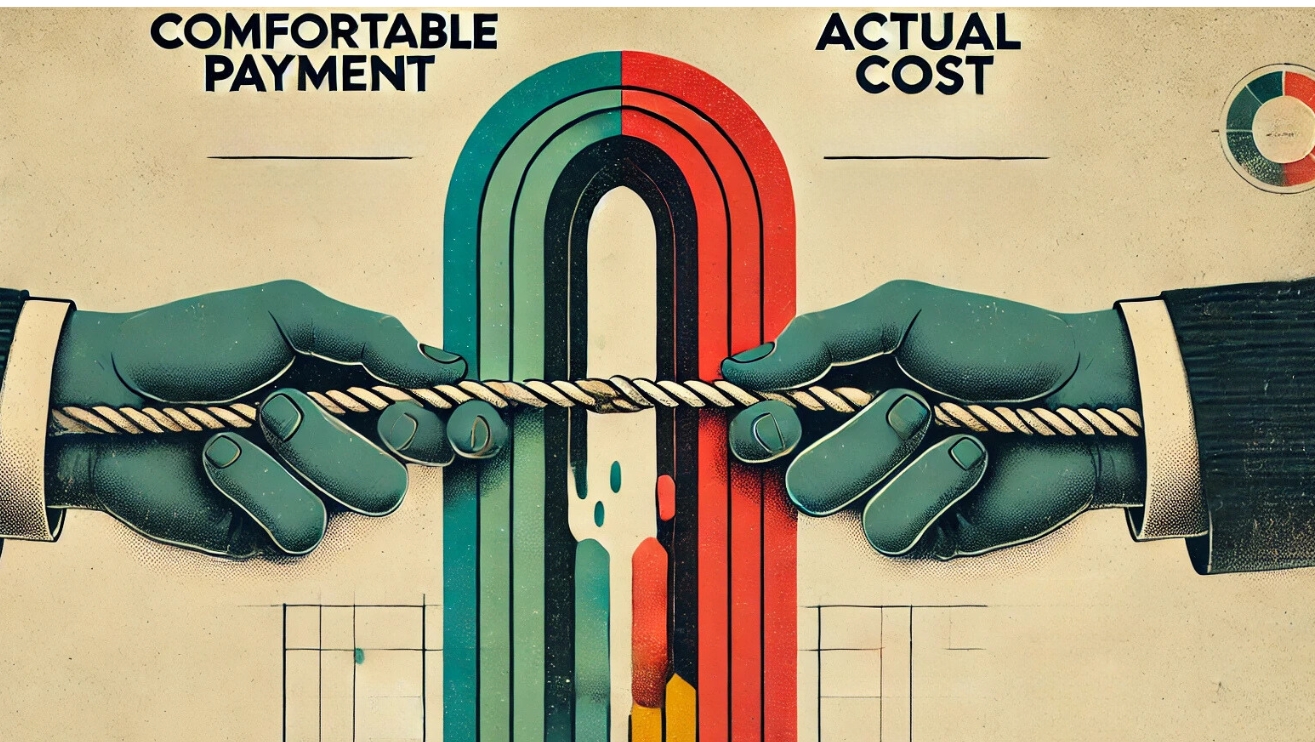"What stood out to me in this survey was that even households earning over $100,000 a year are feeling the pinch, with nearly half unable to comfortably afford housing above $1,749 per month. That shows how pervasive this affordability crisis has become—it’s not just affecting low-income Canadians." - Andy Hill Mortgage Broker and Cofounder of EveryRate.ca
Housing affordability has evolved from a looming issue to an urgent crisis affecting Canadians. For many, the dream of homeownership feels out of reach, with rising costs and stagnant wages creating significant barriers. A new survey conducted by Leger for EveryRate.ca sheds light on just how challenging things have become: 67% of Canadians can’t comfortably afford housing costs above $1,749 per month. Despite this, the average monthly mortgage payment, as reported by the Canada Mortgage and Housing Corporation (CMHC), sits at $1,829 per month.
Let’s break down the numbers and what they mean for Canadians.
What Canadians Say They Can Comfortably Afford
We asked Canadians a simple but telling question: What’s the maximum you can comfortably afford for housing each month? The answers revealed a stark reality:
- 38% said $1,000 or less.
- 67% couldn’t handle anything over $1,749.
- 42% of respondents earning over $100,000 a year said they couldn’t comfortably pay more than $1,749.
These numbers underscore a troubling disconnect between what Canadians earn and what housing actually costs, with even higher-income households feeling the pinch.
Who Took the Survey?
The survey gathered insights from a wide cross-section of Canadians, representing various demographics:
Income Levels: A significant portion of respondents (56%) reported household incomes of $60,000 or more, indicating the survey captured the perspectives of middle- to high-income Canadians. This suggests that housing affordability challenges are not confined to lower-income households, but are widespread across different income brackets.
Education: The majority of participants have post-secondary education, with 71% holding a college diploma or university degree. This reflects a well-educated respondent base, emphasizing that even Canadians with higher earning potentials are feeling the strain of housing costs.
Homeownership: Over half of the respondents (63%) are homeowners. This high rate of homeownership highlights that even those who have already entered the housing market are experiencing affordability issues, whether through mortgage payments that exceed their comfort levels or concerns about maintaining their housing costs.
Comfortable Payments vs. Reality
How do these comfort levels compare to what Canadians are actually paying? We analyzed data from CMHC and rent statistics from Rents.ca, and the results reveal a concerning reality:
Provincial Housing Affordability Comparison
The map below compares the average comfortable payment reported by respondents in each region to CMHC's average monthly mortgage payments for new mortgages. The differences highlight significant gaps in affordability.
Regions like British Columbia (BC) and Ontario experience the largest gaps, with CMHC payments exceeding comfort levels by 62.8% and 54.3%, respectively. Conversely, Quebec and provinces in Atlantic Canada have lower housing costs, resulting in more manageable gaps.
City-Level Housing Affordability Comparison for First-Time Buyers
At the city level, the disparity between comfortable payments and actual mortgage costs becomes even more pronounced, especially for first-time buyers. For instance, in Vancouver, the average monthly mortgage payment of $4,238 exceeds the comfortable payment threshold of $1,787 by 137%. Similarly, in Toronto, mortgage payments average $3,550, surpassing the comfortable payment level of $1,620 by over 119%. These staggering margins highlight the significant financial burden faced by those trying to enter the housing market in Canada’s largest cities.
Why Is There Such a Disconnect?
The gap between what Canadians report as comfortable housing costs and the actual amount they pay stems from several factors that highlight the growing financial pressure facing households across the country:
Stretching Beyond Comfort - Canadians are paying more for housing than they can realistically manage, with inflation and rising borrowing rates straining their budgets. This financial pressure forces many to make difficult trade-offs: cutting back on savings, delaying retirement contributions, or taking on increasing amounts of credit card debt. These choices may provide short-term relief, but they often come at the cost of long-term financial stability, leaving households more vulnerable to future economic shocks.
Averages Mask Realities - National averages, like those reflected in CMHC’s data, blur the lines between financial realities of long-term homeowners with stable mortgages and recent home buyers facing sky-high prices and rates. This makes the market seem more affordable than it actually is for most people.
Sacrifices and Trade-Offs - Many Canadians are draining their savings and acquiring debt just to keep up. Data from Equifax shows credit card debt has hit $122 billion and repayment delinquencies are climbing, especially among younger Canadians.
Rising Debt and Delinquencies - Mortgage delinquency rates are increasing (now at 0.19%) alongside auto loan delinquencies (2.42%), indicating an environment off financial strain that extends far beyond housing.
Conclusion: Collaborative Efforts to Bridge the Affordability Gap
The disconnect between Canadians' financial comfort levels and the reality of housing costs underscores the impact of the affordability crisis. By taking proactive steps—such as shopping for better mortgage rates, exploring alternative housing options, and advocating for supportive policies, especially at the municipal and provincial levels where most housing decisions are made—Canadians can begin to close the gap and regain control of their financial futures.
At EveryRate.ca, we're dedicated to assisting Canadians in navigating these challenges by providing resources and tools to make smarter financial decisions. From comparing mortgage rates tailored to your needs to offering educational content that demystifies financial jargon, we aim to empower Canadians with the knowledge they need to regain control.
Making informed decisions about your mortgage can have a profound impact: reducing monthly financial strain, freeing up cash flow for savings, and avoiding costly debt traps.
If you’re unsure about your options or just want to see how much you could save, EveryRate.ca is here to help you get started. Together, we can make housing decisions that work for you—not against you.
About the Survey - This survey was conducted online by Leger using its Canadian omnibus platform on behalf of EveryRate.ca. Fieldwork took place between November 15 and 18, 2024, with 1,526 Canadian adults aged 18 and older completing the survey.
The sample was statistically weighted to reflect the Canadian population according to the 2021 Census of Canada figures. While the sample is a non-probability panel survey, for comparison purposes, a probability sample of this size would have a margin of error of ±2.5%, 19 times out of 20.
Other popular articles: Questions You Must Ask Your Mortgage Broker Before Refinancing | Fixed vs. Variable-Rate Mortgages: Which is Right for You? | Mortgage Refinancing for Retirees: What You Need to Know | The No-Nonsense Guide to Mortgage Refinancing in Canada | Personal Line of Credit vs Home Equity Loan vs HELOC: How to Choose | Common Questions About the Canadian RRSP HBP Mortgage Rates in Vancouver | Mortgage Rates in Victoria | Mortgage Rates in BC | Mortgage Rates in Ontario | Mortgage Rates in Richmond | Mortgage Rates in Surrey | Mortgage Rates in Burnaby | Mortgage Rates in Delta | Mortgage Rates in Abbotsford | Mortgage Rates in Kelowna | Mortgage Rates in Nanaimo | Mortgage Rates in Saskatchewan


